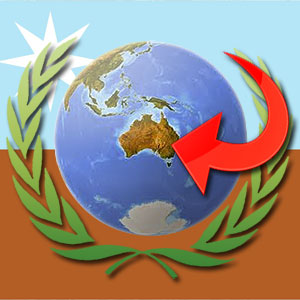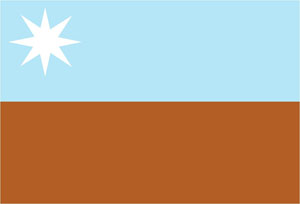Italian Media: Birth of the Republic of Aboriginal Murrawarri


Murrawarri Republic Flag
Mauro Indelicato il faro sul mondo 23 May 2013
It is a territory of 200 kilometres from East to West and 250 kilometres from North to South, approximately the same distance as between the regions of Basilicata and Sicily. The desert-like area is some 600 kilometres from the Pacific Ocean, and holds few inhabitants. Yet from this small piece of land comes a new challenge and re-emerges a new aspect of an old problem: the Indigenous People's right of self-determination. It does not matter that the Main Stream Media have ignored the event: the fact is that the new Republic of Murrawarri, straddling the border between the States of New South Wales and Queensland is born. It is a State with few inhabitants, still without a capital, which nevertheless has given the entire world and not only Australia a lesson in civic sense and an example of self-determination.
Murrawarri is an Aboriginal name, the culture of the area has always been Aboriginal, and was never suppressed by the English invaders. The new country is in a strong position to assert its rights in the letters sent to Queen Elizabeth II and to the Secretary General of the United Nations.
In short, the event is not the result of a collective self-suggestion in a small place, and cannot in any way be compared with the 1996 proclamation of independence of the Padania [as an expression of separatism from the Republic of Italy]. It is rather a liberation movement of people who have always been placed at the margin of Australian social life and know how to do things in an orderly fashion: on 30 March the founders sent a letter to Queen Elizabeth, as head of the Commonwealth; in it they stated that the lands taken into possession by the English several centuries ago had only been lent: "The Murrawarri People - one may read in the message - has never transferred its sovereignty on these lands, on these waters, on the aereal space and on the natural resources of its territory, [ ... ] but has simply granted their use by the British Crown and is free to revoke such concession at any time."
The letter closes with the request to the British Crown to locate the documents which purport to assert the Commonwealth's ownership-title on the Murrawarri lands, and to produce such title within 28 working days, the last being 8 May 2013. "Silence - the letter says - will be tantamount to implicit recognition of the Murrawarri Republic as a free and independent State, in conformity with the usual principles of international conventions."
No reply has come either from London or from Canberra, and thus, since ten days ago, the State of Murrawarri regards itself free, sovereign and independent; it has already set up a Ministry of Defence and another of Industry and it has sent to the United Nations every documentation necessary to recognition and admission to the Organisation Office in New York.
The silence of the Australian federal government, perhaps justifiable in view of the surprise of the declaration, may give way to three important considerations.
The first concerns the internal situation of Australia, which evidently failed to resolve the dispute with the Indigenous People, although there have been opportunities so to do: at the 2000 Sydney Olympics, where Katy Freeman, an Aboriginal athlete was called to lit the Olympic cauldron and was the last torchbearer; but the many good intentions of the Australian political class to reach a reconciliation with the Indigenous Peoples of the Continent counted for little or naught. Now the independence of Murrawarri, though it may cost very little from an economic point of view considering the smallness of the territory, comes as a source of worry - and not a small one - for fear that it may be followed by other Indigenous People at the centre of the island.
A second consideration has a large international aspect and reflects, in general, as the opening of an era in which, taking advantage of the increased weakness of 'Western' powers during the past years, the once colonised populations may grow separated from the colonising countries and, after so many colonies gained their independence after the second world war, now is the time for the self-determination of Peoples who were locked inside the territory of the colonising powers
Finally, the last and perhaps the most important consideration is in the realisation of the world crisis which surrounds the function of the nation state, seen as a threat to the formation of a new world order in which there are irresponsible attempts to set up supernational entities and yet there are still those who believe in their right to self-determination, in the value of one's own State and who resist attempts at creating some kind of universal world culture.
Perhaps it is too early to say whether the experiment of Murrawarri will survive or not; but it carries with it a breath of optimism for those who do not surrender to the process of destruction of the nation-state entity.
Nasce la Repubblica aborigena di Murrawarri

Bandiera di Repubblica di Mirrawarri
di Mauro Indelicato il faro sul mondo
Giovedì, Maggio 23, 2013
E' un territorio grande quanto la distanza dalla Basilicata alla Sicilia, con pochi abitanti, situato nel deserto e senza sbocchi sul mare, eppure da questo piccolo lembo di terra australiano arriva una notizia che, essendo stata del tutto snobbata dai media occidentali, allora vuol dire che sta creando diverse spine nel fianco e che rilancia il tema dell'autodeterminazione dei popoli.
Andiamo con ordine: stiamo parlando della neonata Repubblica di Murrawarri, comprendente i territori a cavallo degli Stati australiani del Nuovo Galles del Sud e del Queensland. Uno Stato che ha pochi abitanti, non si conosce ancora la sua capitale, eppure ha dato una lezione di civiltà ed un esempio di amministrazione a tutto il mondo e non solo all'Australia.
Murrawarri è un nome aborigeno ed in effetti la cultura del territorio è sempre rimasta aborigena, non si è mai piegata all'occidentalizzazione forzata imposta dai coloni inglesi, tanto che oggi si rivendica una piena sovranità sul proprio territorio e la si rivendica con tanto di carte alla mano, di lettere indirizzate alla Regina Elisabetta II ed al Segretario Generale delle Nazioni Unite.
Insomma, non sembra proprio un tentativo velleitario nato dall'esaltazione collettiva di un piccolo territorio, nulla di paragonabile alla dichiarazione di indipendenza della Padania del 1996, piuttosto si ha a che fare con un movimento culturale di un popolo da sempre messo ai margini della vita sociale australiana ed hanno saputo fare le cose per bene: il 30 marzo, hanno infatti inviato una lettera alla Regine Elisabetta, a capo del Commonwealth, in cui si esprimeva come le terre prese in possesso dagli inglesi diversi secoli fa erano solo in prestito: "Il popolo Murrawarri - si legge nella missiva - non ha mai alienato la sua sovranità sulle terre, sulle acque, sullo spazio aereo e sulle risorse naturali del proprio territorio, [ ... ] ma ne ha ceduto in concessione il mero esercizio alla corona britannica e può dunque chiederla indietro in qualsiasi momento".
Il documento, si conclude con la richiesta alla Corona britannica di far reperire, in risposta alla lettera, i documenti che attestino la proprietà delle terre Murrawari al Commonwealth; il termine era di 28 giorni lavorativi ed è scaduto quindi l'8 maggio scorso: "Il silenzio - si legge ancora nel testo - vale come ammissione implicita che la Repubblica Murrawarri è da considerarsi uno Stato libero e indipendente, in linea con le norme e le convenzioni internazionali".
Né da Londra e né da Camberra è arrivato nulla, dunque da dieci giorni lo Stato del Murrawarri si ritiene libero, sovrano ed indipendente, ha costituito già un Ministero della Difesa e uno dell'Industria ed ha inviato all'Onu tutto il materiale che avvia la procedura di riconoscimento ed annessione all'organizzazione avente sede a New York.
E' il silenzio del governo federale australiano a dirla lunga sulla sorpresa generata da questa notizia, sulla quale si possono fare almeno tre importanti considerazioni.
La prima riguarda la situazione interna dell'Australia, che evidentemente non è riuscita a risolvere la questione degli aborigeni; a nulla sono valsi gli spot delle Olimpiadi di Sydney 2000, in cui Katy Freeman, atleta aborigena, ha acceso il calderone olimpico ed è stata l'ultima tedofora, così come a poco e nulla sono serviti i tanti buoni propositi della classe politica australiana sui tentativi di riconciliazione con le popolazioni originarie dell'isola. Adesso, l'indipendenza di Murrawarri, anche se da un punto di vista economico porta via poco vista l'esiguità della grandezza del territorio, in realtà preoccupa e non poco per il timore di un effetto di emulazione degli altri popoli aborigeni presenti nel centro del paese.
L'altra considerazione ha invece un respiro più internazionale e riguarda, in generale, l'apertura forse di un'epoca in cui, sfruttando anche la debolezza dell'occidente rispetto a qualche anno fa, i popoli colonizzati vivano una stagione di emancipazione dalla madrepatria e, dopo l'indipendenza di tante colonie avvenute nell'immediato dopoguerra, adesso si arrivi all'autodeterminazione di tanti popoli inclusi all'interno del territorio della nazione dominante.
Infine, l'ultima e forse la più importante considerazione, è inerente al fatto che, in un periodo in cui si vuole mettere in crisi in tutto il mondo la funzione dello Stato nazione, visto come impedimento alla formazione del nuovo ordine mondiale ed in cui si fanno scellerati tentativi di formazione di entità sovranazionali, c'è chi ancora invece crede nella propria autodeterminazione, nel valore che può assumere un proprio Stato e resiste ai tentativi di creazione di un'unica ed universale cultura mondiale.
Magari è ancora presto per dire se l'esperimento di Murrawarri andrà in porto o meno, di sicuro è una bella ventata di ottimismo per chi non si arrende al processo di distruzione dell'entità della Stato nazione.
• Lettera43 politica Murrawarri, gli aborigeni chiedono la sovranità territoriale 26 May 2013
• l'indipendenza Gli aborigeni Murrawarri proclamano l’indipendenza dal Commonwealth 20 May 2013
• la prospettiva del funambolo La Repubblica di Murrawarri e la sfida alla Regina 27 May 2013
• GeoPoliticaMente La Repubblica di Murrawarri e l’irrisolta questione degli aborigeni australiani
Austria
• krone.at Aborigines rufen unabhängigen Staat in Australien aus 3 June 2913
Indonisia
• merdika.com Bangsa Aborigin di Australia ingin merdeka 31 May 2012

